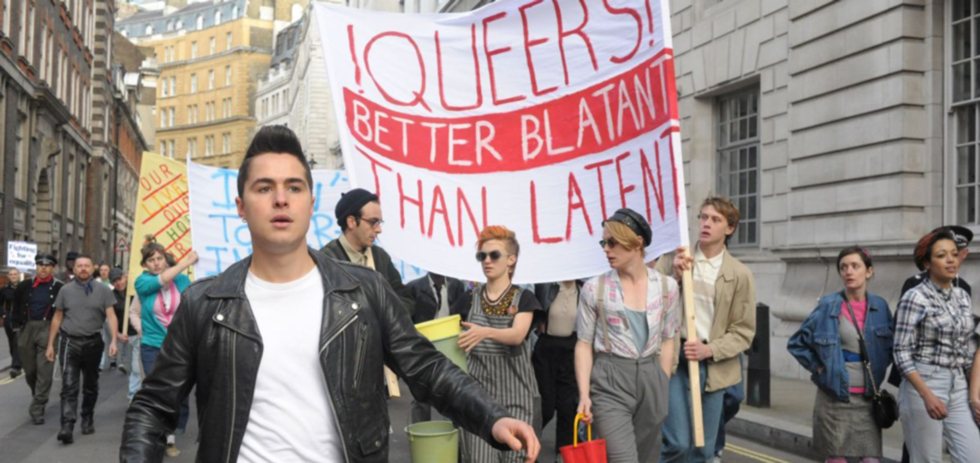
Pride is set in Thatcher’s England and follows a group that call themselves Lesbians and Gays Support the Miners (LGSM), a real group of gays and lesbians who stood in solidarity with the miners on strike in the 80’s. It is your standard British comedy and is littered with all those British actors you would expect, including Bill Nighy, Imedla Staunton, who are, as always, very British. Pride has been a very successful gay film, winning this year’s Queer Palm award at Cannes, perhaps the highest honour in queer cinema. It is easy to see why it has been met with such praise.
It is filled with fully formed and immediately likeable characters, particularly Sian (Jessica Gunning), a Welsh housewife turn activist (who ends up entering Parliament). Andrew Scott, who many will recognise from the BBC’s Sherlock, is an emotional tether for the film. His character, Gethin, spends much of the film with a single tear running down his cheek and Scott nails it every time. Dominic West is a stand out. There is something to be said about watching Detective Jimmy McNulty dance to disco with several elderly women. Pride is fun, it’s smart but it’s not dismissive, either. The audience surrogate for the film is a young, newly out Joe (George MacKay). It is through his eyes that much if the film is told.
There is very little to fault with this film. It’s well-paced, well-acted and very funny. There are times when it feels all too easy – complications that arise are resolved only a few scenes later. But this means it is not a particularly melodramatic film, which is refreshing when queer cinema is concerned. A rendition of “Solidarity Forever” that states “every woman is a lesbian at heart,” speaks volumes to the attitude of the film. Queer cinema often relies on melodramatic representations of coming out or the spectre of HIV to cause an emotional connection with the audience. It is not necessarily a bad thing to do this, but it has been done, again and again, and we’re noticing. Pride is an historical film about gays in the ’80s: it can’t avoid AIDS. But instead of using it to make straight people care about queer people – or ignoring it completely – it handles it in a respectful way.
Much of the humour of the film is derived from the clashing between two, very opposing groups. The parts of the film that focus on the Welsh miners and their hardships are fully realised and fully felt. To be from a small town, to be part of a community like a mining town. To struggle through winter when all the men in town are out of work. The film captures these things beautifully, and it is impossible to not feel reminiscent of Billy Elliot.
A lot of the talk around Pride hailed it as a refreshing, saying that it wasn’t ‘really a gay film’, that it was a film for ‘everyone’. This is not necessarily untrue. The film is as enjoyable as most good British comedies and certainly has very little content that would alienate most viewers. The film, however, is not “just about love,” it’s a film about gay activists who were real people and did good, important work. So much of the dialogue that surrounds popular queer cinema is about trying to convince the masses (read: straight people) these films aren’t too gay, or too niche. No one ever states that we shouldn’t worry about not engaging with a film just because we aren’t Welsh miners on strike.
That is not to say that this film is not as much about gays and lesbians as it is about Wales, being from a small town, about Workers Rights and class action. It is, resolutely and admirably, about all these things and it is better for this. However, to deny the explicit queerness of this film – a film that deals with coming out, with being a queer woman in a male dominated community, with gay bashing and police brutality – does a disservice to the real people it represents, and also to queer people everywhere who will love this movie. It must be said, however, that the most uplifting thing about the film is the idea that all those who struggle have something in common, and we are better united.
